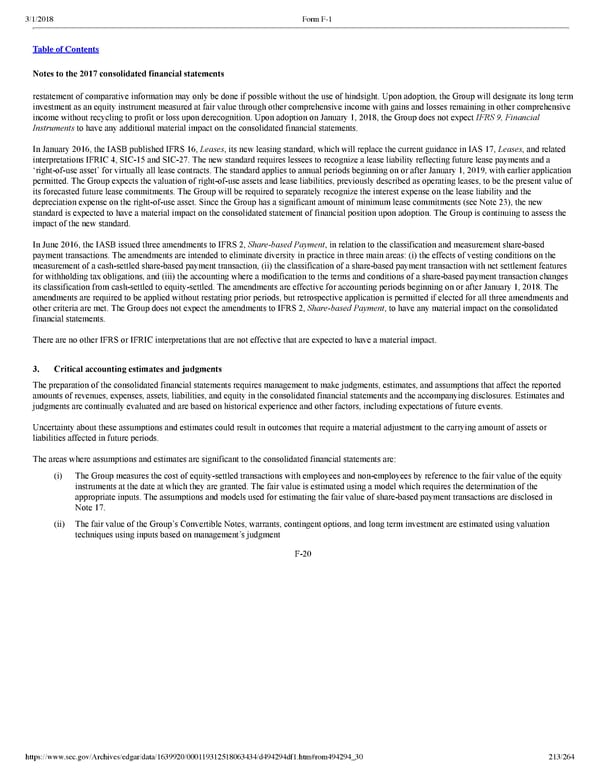213/264 Notes to the 2017 consolidated financial statements restatement of comparative information may only be done if possible without the use of hindsight. Upon adoption, the Group will designate its long term investment as an equity instrument measured at fair value through other comprehensive income with gains and losses remaining in other comprehensive income without recycling to profit or loss upon derecognition. Upon adoption on January 1, 2018, the Group does not expect IFRS 9, Financial Instruments to have any additional material impact on the consolidated financial statements. In January 2016, the IASB published IFRS 16, Leases , its new leasing standard, which will replace the current guidance in IAS 17, Leases , and related interpretations IFRIC 4, SIC15 and SIC27. The new standard requires lessees to recognize a lease liability reflecting future lease payments and a ‘rightofuse asset’ for virtually all lease contracts. The standard applies to annual periods beginning on or after January 1, 2019, with earlier application permitted. The Group expects the valuation of rightofuse assets and lease liabilities, previously described as operating leases, to be the present value of its forecasted future lease commitments. The Group will be required to separately recognize the interest expense on the lease liability and the depreciation expense on the rightofuse asset. Since the Group has a significant amount of minimum lease commitments (see Note 23), the new standard is expected to have a material impact on the consolidated statement of financial position upon adoption. The Group is continuing to assess the impact of the new standard. In June 2016, the IASB issued three amendments to IFRS 2, Sharebased Payment , in relation to the classification and measurement sharebased payment transactions. The amendments are intended to eliminate diversity in practice in three main areas: (i) the effects of vesting conditions on the measurement of a cashsettled sharebased payment transaction, (ii) the classification of a sharebased payment transaction with net settlement features for withholding tax obligations, and (iii) the accounting where a modification to the terms and conditions of a sharebased payment transaction changes its classification from cashsettled to equitysettled. The amendments are effective for accounting periods beginning on or after January 1, 2018. The amendments are required to be applied without restating prior periods, but retrospective application is permitted if elected for all three amendments and other criteria are met. The Group does not expect the amendments to IFRS 2, Sharebased Payment , to have any material impact on the consolidated financial statements. There are no other IFRS or IFRIC interpretations that are not effective that are expected to have a material impact. 3. Critical accounting estimates and judgments The preparation of the consolidated financial statements requires management to make judgments, estimates, and assumptions that affect the reported amounts of revenues, expenses, assets, liabilities, and equity in the consolidated financial statements and the accompanying disclosures. Estimates and judgments are continually evaluated and are based on historical experience and other factors, including expectations of future events. Uncertainty about these assumptions and estimates could result in outcomes that require a material adjustment to the carrying amount of assets or liabilities affected in future periods. The areas where assumptions and estimates are significant to the consolidated financial statements are: (i) The Group measures the cost of equitysettled transactions with employees and nonemployees by reference to the fair value of the equity instruments at the date at which they are granted. The fair value is estimated using a model which requires the determination of the appropriate inputs. The assumptions and models used for estimating the fair value of sharebased payment transactions are disclosed in Note 17. (ii) The fair value of the Group’s Convertible Notes, warrants, contingent options, and long term investment are estimated using valuation techniques using inputs based on management’s judgment F20
 Spotify F1 | Interactive Prospectus Page 212 Page 214
Spotify F1 | Interactive Prospectus Page 212 Page 214